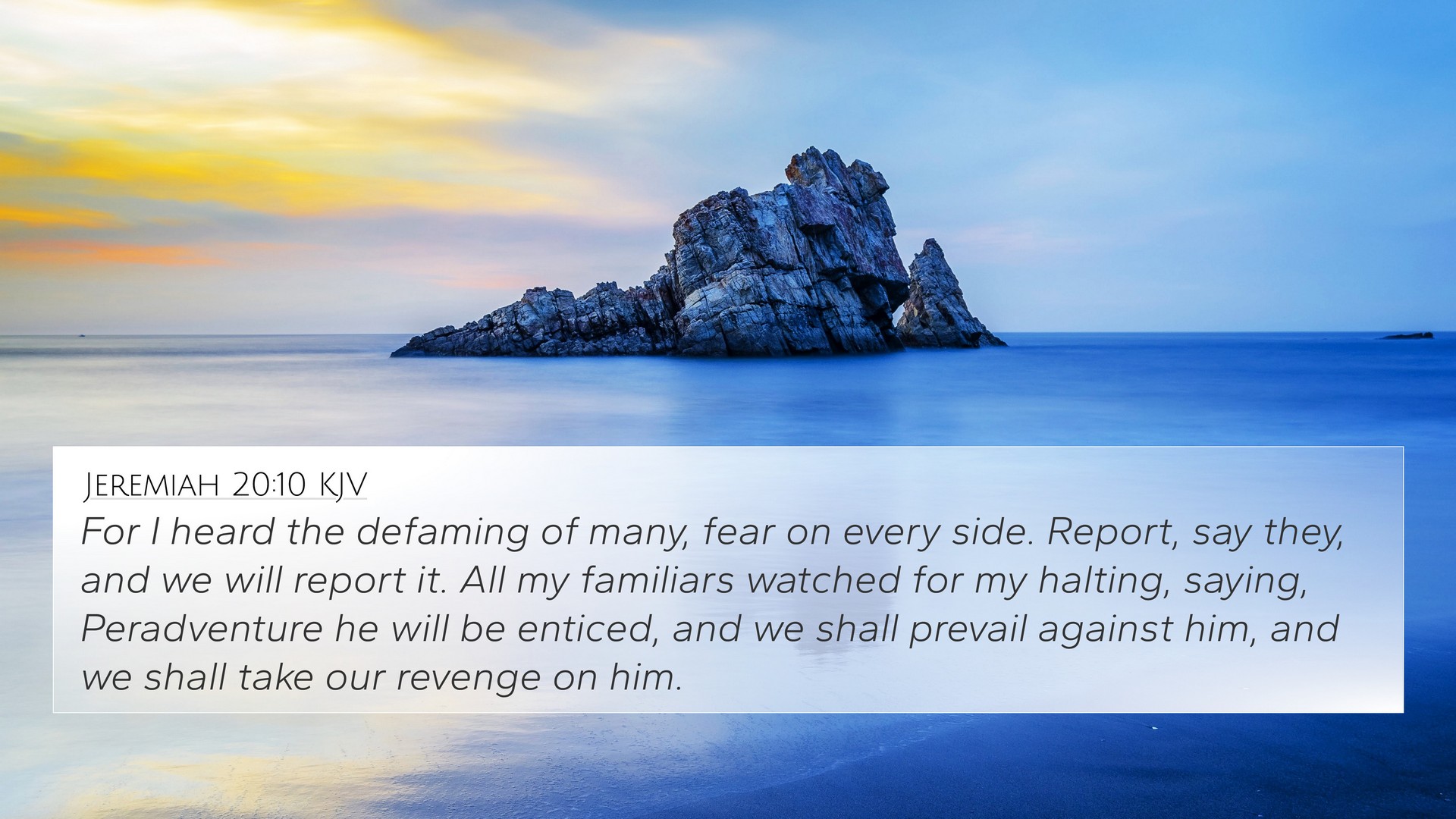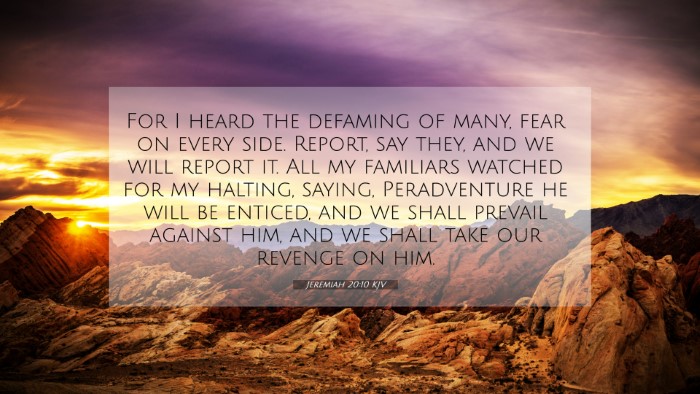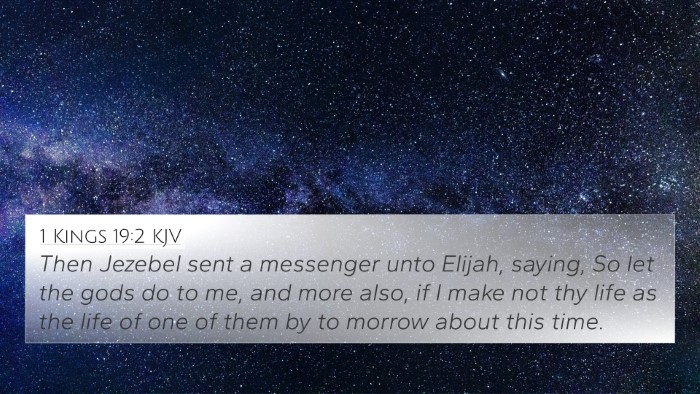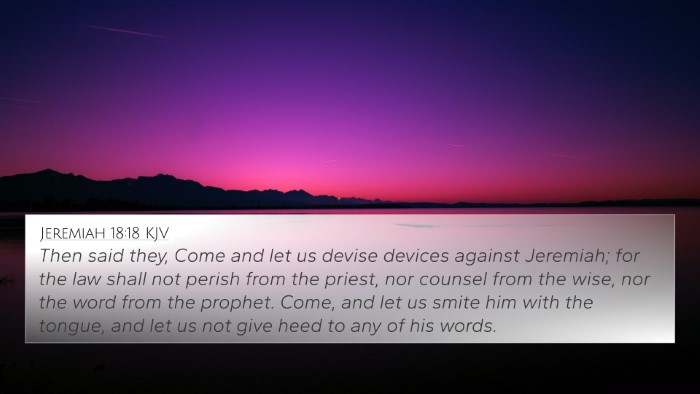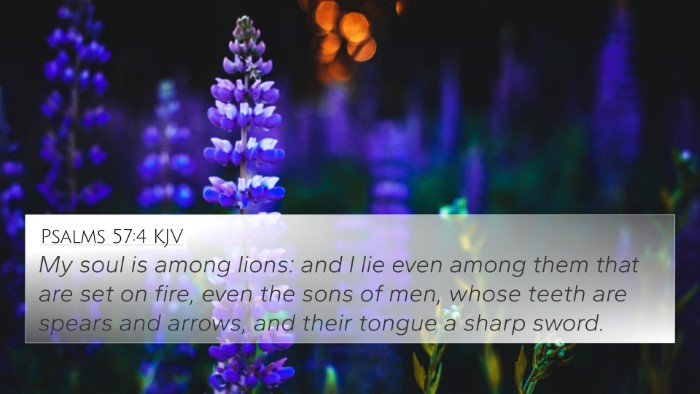Understanding Jeremiah 20:10
Jeremiah 20:10 is a profound verse that exposes the depths of the prophet's anguish and the pressures he faced as a messenger of God. In this verse, Jeremiah expresses his feelings of despair and fear regarding the betrayal and mockery he experiences from others. This commentary will explore its meaning and implications, drawing insights from respected public domain commentaries to provide a comprehensive understanding.
Verse Context
The historical context of Jeremiah's ministry is critical to understanding this verse. Jeremiah prophesied during a turbulent time in Judah's history, marked by moral decay, idolatry, and impending judgment from God. His role as a prophet was not only to foretell God's judgment but also to call the people to repentance. As a result, he faced significant opposition, persecution, and isolation.
Verse Content
Jeremiah 20:10 reads:
"For I heard the defaming of many, terror on every side. Report, say they, and we will report it. All my familiars watched for my halting, saying, Peradventure he will be enticed, and we shall prevail against him, and we shall take our revenge on him."
Commentary Insights
-
Matthew Henry:
Henry emphasizes Jeremiah's vulnerability and the emotional trauma caused by the treachery of those around him. He notes that the prophet’s lamentation reflects the universal human experience of betrayal. Henry points out that the enemies of Jeremiah not only sought to undermine him spiritually but also aimed to bring physical harm. This illustrates a deeper spiritual warfare that often accompanies God’s messengers.
-
Albert Barnes:
Barnes elaborates on the societal context in which Jeremiah operates. He highlights the danger of peer pressure that led many to conspire against the prophet. Barnes suggests that the repeated "terror on every side" indicates the complete isolation felt by Jeremiah, providing a broader understanding of the emotional impact of prophetic ministry. He draws parallels to various instances in Scripture where prophets faced similar trials, encouraging readers to recognize the spiritual battles inherent in following God’s calling.
-
Adam Clarke:
Clarke reflects on Jeremiah's emotional state, emphasizing the psychological strain of his prophetic role. He notes that the language of “defaming” and “terror” encapsulates the dual nature of Jeremiah's suffering - both verbal and spiritual assaults. Clarke also implies that this experience serves as a model of prophetic resilience in the face of adversity. He suggests that understanding Jeremiah’s plight leads believers to appreciate the serious commitment that accompanies prophetic calling.
Bible Verse Cross-References
- Psalms 31:13: "For I hear the slander of many; terror is on every side; while they took counsel together against me, they schemed to take away my life."
- Job 16:10: "Men have gaped at me with their mouth; they have struck me insolently on the cheek; they mass together against me."
- Matthew 10:36: "And a man's foes will be those of his own household."
- Jeremiah 9:4: "Let everyone be on guard against his friend, and do not trust any of your brothers; for every brother is a supplanter, and every friend a slanderer."
- Luke 21:16: "You will be delivered up even by parents and brothers and relatives and friends, and some of you they will put to death."
- Isaiah 53:3: "He was despised and rejected by men; a man of sorrows, and acquainted with grief; and as one from whom men hide their faces he was despised, and we esteemed him not."
- Micah 7:6: "For the son treats the father with contempt, the daughter rises up against her mother, the daughter-in-law against her mother-in-law; a man's enemies are the men of his own house."
Thematic Connections
The themes of betrayal, isolation, and the emotional toll of prophetic ministry resonate throughout Scripture. Jeremiah 20:10 particularly highlights the following themes:
- Betrayal by Close Ones: Just as Jeremiah experienced betrayal, this theme is echoed in various Psalms and the lives of other prophets.
- Courageous Perseverance: God’s call on a believer’s life often requires enduring hardship, shown through the examples of Job and Jesus.
- Emotional Strain of Ministry: The burdens of prophetic calling lead to a deep understanding of human vulnerability, seen across prophetic literature.
Cross-Referencing Biblical Texts
Cross-referencing Biblical texts enriches the understanding of complex themes like those in Jeremiah 20:10. Tools for Bible cross-referencing, such as concordances and digital Bible study tools, can help users find connections between verses efficiently. These connections can illuminate similar experiences faced by prophets, reinforcing the shared human experience of suffering for righteousness.
How to Use Bible Cross-References
To engage in a deeper study of Scripture, the following methods are recommended:
- Use a Bible concordance to find keywords related to feelings of despair and betrayal.
- Look for a Bible cross-reference guide that lists verses about prophetic suffering.
- Engage in comparative Bible verse analysis by examining the similarities between Jeremiah's experiences and those of Jesus.
Conclusion
Jeremiah 20:10 serves as a poignant reminder of the trials that can accompany a commitment to God's calling. The feelings of isolation, betrayal, and emotional turmoil resonate with believers as they navigate their spiritual journeys. By exploring the insights from Matthew Henry, Albert Barnes, and Adam Clarke, and by utilizing cross-referencing methods, readers can deepen their understanding of this verse and its implications for both personal faith and ministry.
